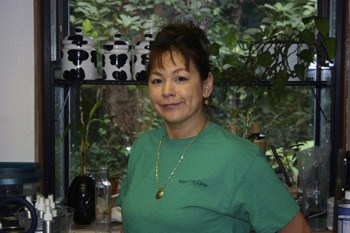In the way that most downs are followed by ups, Jill Paull got sick from toxic chemicals she used to clean houses for $8 an hour and then became well – physically, emotionally and economically.
“I was a single mom (of two girls) on welfare and I took any job I could get,” said Paull, who is now the owner of Island Green Clean, an organic home and office cleaning service and product supplier.
“I was cleaning houses for minimum wage when I got sick off the bleach and ammonia we used. At first I didn’t know I was chemically sensitive and I kept working, but after a few months it turned into pneumonia,” she said.
Desperate, she started making contacts through Bainbridge Island’s Moms Network, which helped lead her to Washington’s CASH (Community Alliance for Self Help) program. Over several months, the small-business program helps clients by offering micro-loans, business development classes and, most importantly, peer support through the use of outside experts and CASH success stories.
Paull now fits into the latter category after sharing her story with the more than 400 people who attended the flourishing program’s annual banquet in 2007.
She is quick to give her many mentors credit, including Bainbridge Island’s Bill Hoke and Marsh Terry, and Stuart Walton, a former owner of Paper Products, Etc., who is now the local CASH program director. But guidance can only go so far.
“CASH gives you the tools and shows you the way,” she said, “but you have to have the hunger to proceed. I have that.”
Paull, a descendant of Filipino (Bainbridge Island) and Squamish Nation (British Columbia) ancestry, returned to Bainbridge Island in 2000 unemployed and with few prospects other than working in a restaurant or cleaning houses.
She chose the latter and eventually realized there was an economic upside to a janitorial service on an island with a median household income of nearly $100,000. With the CASH training and support inspiring her, Paull started her own business. But it was a traditional janitorial service for several months.
“Jill had a paradigm shift,” Walton said. “She has this entreprenural spark where she is willing to take a calculated risk because of her inner strength and confidence.”
He said it took a while, “but she had a game-changing moment where she would take her house-cleaning business to another level by using only non-chemical products. She figured out how to do it and then came up with the perfect name for her new business.”
Walton said her epiphany was also an eye-opener for CASH staff.
“We realized we had to be more aware of what had happened to her,” Walton said. “She had taken what we do here one step further. We saw what could happen when an unusual person like her is in the right place at the right time. It’s hard to define, but it’s about confidence and perseverence to the degree that she’ll never, never, never quit. And that kind of persona is irresistible to people, especially investors. She has those kinds of characteristics.”
She started experimenting in her kitchen sink with a mixture of tea tree oil, baking soda, vinegar, water and other essential oils (patent pending). But something was missing until she took the suggestion of one of her daughters’ teachers to add lavender (liquid or powder)to the concoction.
“That did it,” she said. “Lavender gave it the antiseptic quality that was missing and that great fragrance. It’s also very calming.”
She now sells her all-purpose cleaner – still brewed in her kitchen sink – wholesale by the half-gallon or in two-and-one-half ounce containers that are easy to carry around in a purse or can be used in environments such as airplanes.
Paull said she hopes to eventually sell large amounts of the product to the U.S. government, which would certainly take it out of her kitchen and into a location where mass production would be possible. She is also exploring placing the cleaner on retail shelves.
She has applied for an additional CASH loan and Squamish Nation Trust grants, which would provide her with seed money to expand her business, especially the product side of it.
“It’s exciting and kind of overwhelming at this stage,” she said. “I’d like to eventually go international with the product. I already have some contacts in Guam.”
Not bad for someone who was on the dole five years ago.
“It’s all about empowerment,” she said. “With that in place, you start small, work on your self-reliance and see where it takes you. I know what I’m doing.”
While product expansion and becoming more of a consultant appears to have the highest potential, her success is still tied to her cleaning houses and larger buildings, including the Bainbridge Island Post Office and Bloedel Reserve.
Her business grew exponentially when she became more of a general contractor who subs out jobs – primarilly the many large homes on the island. She now has five sub-contractors, all of whom use her organic products and get referrals from her Web site (islandgreenclean.com).
“I’ve continued growing the network and we’re trying to keep up with the demand,” she said. “Things keep getting dirty, so there’s plenty of work to go around.”
With Green Clean, a little more elbow grease may be required. but it’s better than using a poisonous cleanser.



